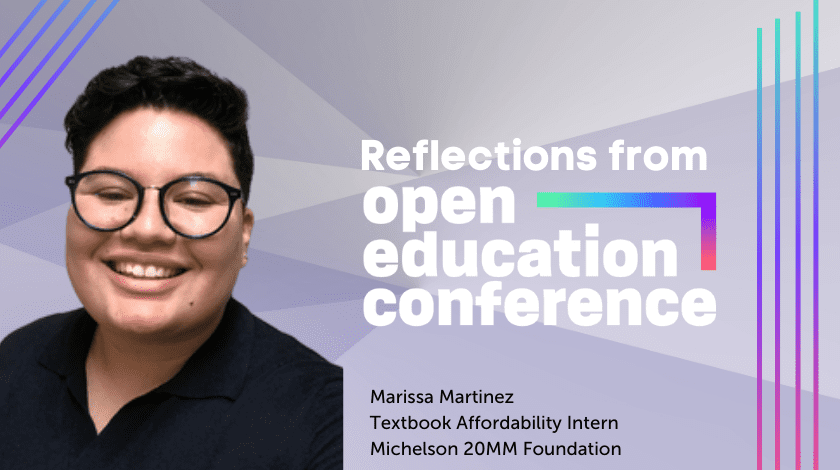News and Announcements
OER Gives Students the Opportunity to Reclaim Their Education—How Open 22 Inspired a Recent Graduate
Published Date
- November 30, 2022

By Marissa Martinez
In September of 2015, I took out my first student loan. It covered the cost of my university textbooks and course materials. I was freshly 18 and on my own for the first time, I even remember handing my (still vertical) ID to the Free Application for Federal Student Aid (FAFSA) counselor to process my loan. I didn’t know the difference between a subsidized or unsubsidized loan, so I chose whichever one the counselor suggested. I was just grateful that I was able to pay for my textbooks—I remember waiting an hour in line at my university’s Textbook Annex to buy my books, and I remember the almost two feet long receipt.
OER stands for Open Educational Resources, which are free course materials that can be tailored to each specific classroom. Yup, free! It sounds like a pipe dream, but it’s real. Free course materials sounds like a gimmick because struggling to pay for course materials is so normalized it almost feels integral to the entire college experience. Having free course materials would have completely changed my undergraduate experience since not having to worry about course material costs would have saved me the hundreds of dollars and dozens of hours I spent fighting for the resources I needed to survive in higher education.
Almost seven years later, I attended the 2022 Open Education Conference. The conference was a mix of live and pre-recorded sessions from students, faculty, policy analysts, research experts, college administration, and everyone in between. As the Michelson 20MM OER Textbook Affordability Intern, I have been working on developing a base of student leaders to advocate for OER and Zero Textbook-Cost (ZTC) programming within their community college districts. For the conference, I chose sessions that focused on students, policy, and advocacy.
The conference showcased how OER is not just dissolving cost barriers to higher education, it is also changing the higher education landscape and creating a new learning experience. I attended the “Empowering Student Voices in Decolonizing Higher Education” workshop, which highlighted strategies to include students in course planning and creating course material. The concept of giving students the power to curate a course to reflect themselves and their communities is incredibly powerful. It creates a synergetic classroom environment and dismantles traditional power dynamics between students and instructors, while allowing students and faculty to create learning material in which they see themselves.
What it means to be a student is constantly evolving due to many factors like the rise of tuition costs, housing crisis, digital inequity, and other unpredictable cataclysm (such as a global pandemic). I only recently graduated this past spring from the University of California, Merced, but even now the fight for student resources looks different than it did six months ago. The opening panel “Rising to Action: Students at the Heart of Open Education” was a student-led discussion on the student experience as it relates to Open Education. It quickly became apparent that these speakers were experts in student advocacy, not necessarily because they wanted to be, but because they needed to be. There is hardly room to exist as only a student when there’s an attack on your education—it’s akin to trying to sleep at night when there’s a monster named PearsonMcGrawHillCengage hiding under your XL twin bed. Students across higher education systems are organizing coalitions, lobbying their policy makers, and actively holding their institutions accountable to prioritize their students instead of textbook publishers. Students are rising to challenge the textbook monopoly and believe in the future of OER.
Students deserve to pursue a degree for the sake of an education with no strings attached. Students deserve to see their communities reflected in the material they learn from. Students deserve to have power in their education. OER gives students the opportunity to reclaim their education as it is an investment in a future that won’t force students to become experts in advocacy. Coming out of the 2022 Open Education Conference, I feel invigorated. It’s clear that we need all hands on deck to corner the textbook monopoly, and most importantly we need to have the student experience at the center of our work as we continue to win.
Michelson 20MM is a private, nonprofit foundation seeking to accelerate progress towards a more just world through grantmaking, operating programs, and impact investing. Co-chaired and funded by Alya and Gary Michelson, Michelson 20MM is part of the Michelson Philanthropies network of foundations.
To sign up for our newsletter, click here.